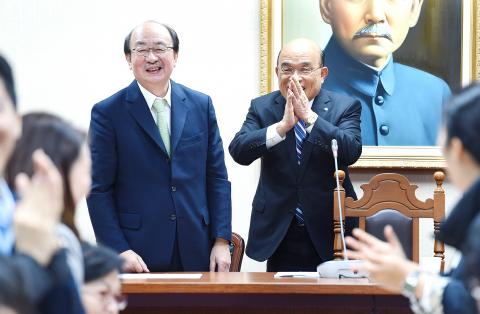The Executive Yuan yesterday unveiled a special bill for COVID-19 prevention, relief and recovery that includes a proposed maximum fine of NT$1 million (US$33,053) for people who break their quarantine.
People who break a home quarantine would face a fine of NT$100,000 to NT$1 million, while those who break a quarantine at a government-designated quarantine center would face a fine of NT$200,000 to NT$1 million, the bill states.
Firms that voluntarily pay quarantined employees, or employees who take leave to care for children under quarantine, would benefit from a break in “profit-seeking enterprise income tax” of up to twice the salary payout, it states.

Photo: Liao Chen-huei, Taipei Times
People who are furloughed after being placed under government-designated quarantine or home quarantine may request compensation from health authorities within two years, it states.
Government agencies, schools and companies may not rule that an employee under quarantine, or taking care of family members under quarantine, is absent without leave, force them to file for leave, or cancel their attendance bonus or deduct days off that they have earned, it states.
Employers who break this rule would be fined between NT$50,000 and NT$1 million, it states.

Photo: Wang Shan-yan, Taipei Times
Individuals or entities who defy an order of the Central Epidemic Command Center, or contingency measures that the center implements, including those who refuse to comply with the government’s setting aside of goods for disease prevention, would also be subject to a fine of between NT$50,000 and NT$1 million, it states.
People who hoard or attempt to hoard equipment or medicines deemed necessary for disease prevention, as published by the Ministry of Health and Welfare, would face a prison term of up to five years and a possible fine of up to NT$5 million, it states.
Those who spread disinformation or rumors about an epidemic to the extent that it hurts the public interest would face a prison term of up to three years or a fine of up to NT$3 million, it states.
The bill stipulates that the health ministry should issue subsidies to healthcare personnel responsible for disease prevention, treatment or care during the COVID-19 outbreak, while employees who prevent COVID-19 with excellence at government agencies, schools, companies or organizations should be rewarded by their employer.
If a person in charge of disease prevention dies from COVID-19, the ministry should subsidize the educational costs of their children, it states.
The bill stipulates that it be funded by NT$60 billion of surplus revenue from prior fiscal years or loans.
Before the special budget is approved by the Legislative Yuan, funding related to company bailouts or the offsetting of economic losses in certain sectors may be appropriated from existing budget, it states.
If passed, the bill would be retroactively applied to Jan. 15 — the day that the disease was declared a class-5 epidemic — and would remain in effect until June 30 next year, except for Articles 12 to 16, which deal with penalties, which would take effect once ratified.
Premier Su Tseng-chang (蘇貞昌) said he approved the bill and has asked government agencies to communicate extensively with the four legislative caucuses so that it can pass quickly.
The Executive Yuan is to finish planning the special budget and unveil it within a week, Su said, adding that the bill would hopefully pass in time to tide over sectors affected by the outbreak.
Yesterday, the Ministry of Economic Affairs unveiled a plan to provide NT$3.47 billion in relief funds to manufacturers.
Deputy Minister of Economic Affairs Wang Mei-hua (王美花) said that the fund would cover local companies planning to move their operations back home amid the COVID-19 outbreak, but the Ministry of Economic Affairs is still assessing whether to subsidize “rootless” firms that do not have facilities in the nation.

Right-wing political scientist Laura Fernandez on Sunday won Costa Rica’s presidential election by a landslide, after promising to crack down on rising violence linked to the cocaine trade. Fernandez’s nearest rival, economist Alvaro Ramos, conceded defeat as results showed the ruling party far exceeding the threshold of 40 percent needed to avoid a runoff. With 94 percent of polling stations counted, the political heir of outgoing Costa Rican President Rodrigo Chaves had captured 48.3 percent of the vote compared with Ramos’ 33.4 percent, the Supreme Electoral Tribunal said. As soon as the first results were announced, members of Fernandez’s Sovereign People’s Party

MORE RESPONSIBILITY: Draftees would be expected to fight alongside professional soldiers, likely requiring the transformation of some training brigades into combat units The armed forces are to start incorporating new conscripts into combined arms brigades this year to enhance combat readiness, the Executive Yuan’s latest policy report said. The new policy would affect Taiwanese men entering the military for their compulsory service, which was extended to one year under reforms by then-president Tsai Ing-wen (蔡英文) in 2022. The conscripts would be trained to operate machine guns, uncrewed aerial vehicles, anti-tank guided missile launchers and Stinger air defense systems, the report said, adding that the basic training would be lengthened to eight weeks. After basic training, conscripts would be sorted into infantry battalions that would take

GROWING AMBITIONS: The scale and tempo of the operations show that the Strait has become the core theater for China to expand its security interests, the report said Chinese military aircraft incursions around Taiwan have surged nearly 15-fold over the past five years, according to a report released yesterday by the Democratic Progressive Party’s (DPP) Department of China Affairs. Sorties in the Taiwan Strait were previously irregular, totaling 380 in 2020, but have since evolved into routine operations, the report showed. “This demonstrates that the Taiwan Strait has become both the starting point and testing ground for Beijing’s expansionist ambitions,” it said. Driven by military expansionism, China is systematically pursuing actions aimed at altering the regional “status quo,” the department said, adding that Taiwan represents the most critical link in China’s

‘REALLY PROUD’: Nvidia would not be possible without Taiwan, Huang said, adding that TSMC would be increasing its capacity by 100 percent Nvidia Corp CEO Jensen Huang (黃仁勳) on Saturday praised and lightly cajoled his major Taiwanese suppliers to produce more to help power strong demand for artificial intelligence (AI), capping a visit to the country of his birth, where he has been mobbed by adoring fans at every step. Speaking at an impromptu press conference in the rain outside a Taipei restaurant, where he had hosted suppliers for a “trillion-dollar dinner,” named after the market capitalization of those firms attending, Huang said this would be another good year for business. “TSMC needs to work very hard this year because I need a lot